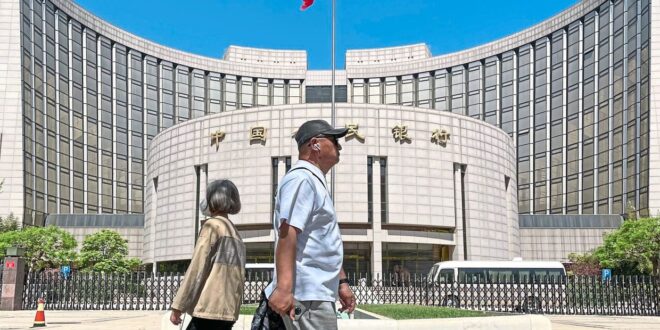SHANGHAI: China is widely expected to leave benchmark lending rates unchanged on Monday, a Reuters survey showed, as encouraging first quarter economic data reduces the urgency for further monetary stimulus to aid a fragile recovery.
A weakening yuan also continues to restrict the headroom available for Beijing to easy policy.
The loan prime rate (LPR) normally charged to banks’ best clients is calculated each month after 20 designated commercial banks submit proposed rates to the People’s Bank of China (PBOC).
In a survey of 30 market watchers conducted this week, all respondents expected both the one-year and the five-year LPRs would stay unchanged.
Most new and outstanding loans in the world’s second-largest economy are based on the one-year LPR, which stands at 3.45%.
The five-year LPR, which serves as the mortgage reference rate, is currently at 3.95% after a 25-basis-point reduction in February to support the housing market.
The strong consensus for steady LPR fixings comes after China’s economy grew faster than expected in the first quarter, offering some relief to officials as they try to shore up growth in the face of protracted weakness in the property sector and mounting local government debt.
“Currently, with the stronger-than-expected Q1 growth, we think the authorities may be reluctant to roll out any additional supportive macro policies,” said Wang Tao, chief China economist at UBS.
Wang said she no longer expects a reduction to the medium-term policy rate but thinks a LPR cut was still likely.
The medium-term lending facility (MLF) rate serves as a guide to LPRs and markets generally closely track of the MLF rate as a precursor for any changes in lending benchmarks.
China’s yuan has lost 2% to the U.S. dollar so far this year, and remains biased to the downside, pressured by its relative low yields versus other currencies and outflows of foreign investment from an anaemic stock market.
“The intense concern with the bilateral USD/CNY exchange rate may even be preventing the PBOC from cutting interest rates further,” said Alvin Tan, head of Asia FX strategy at RBC Capital Markets.- Reuters
 BeritaKini.biz Berita Viral Terkini di Malaysia
BeritaKini.biz Berita Viral Terkini di Malaysia





